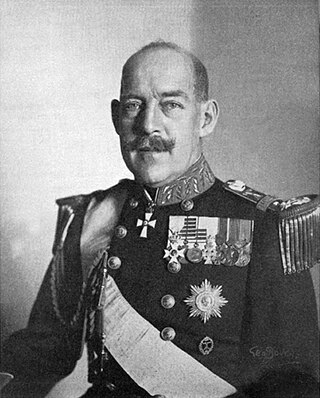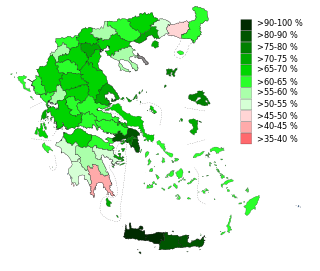
Constantine II was the last king of Greece, reigning from 6 March 1964 until the abolition of the Greek monarchy on 1 June 1973.

Paul was King of Greece from 1 April 1947 until his death on 6 March 1964.

George II was King of Greece from 27 September 1922 until 25 March 1924, and again from 25 November 1935 until his death on 1 April 1947.

Constantine I was King of Greece from 18 March 1913 to 11 June 1917 and from 19 December 1920 to 27 September 1922. He was commander-in-chief of the Hellenic Army during the unsuccessful Greco-Turkish War of 1897 and led the Greek forces during the successful Balkan Wars of 1912–1913, in which Greece expanded to include Thessaloniki, doubling in area and population. The eldest son of George I of Greece, he succeeded to the throne following his father's assassination in 1913.
The abolition of monarchy is a legislative or revolutionary movement to abolish monarchical elements in government, usually hereditary. The abolition of an absolute monarchy in favour of limited government under a constitutional monarchy is a less radical form of anti-monarchism that has succeeded in some nations that still retain monarchs, such as Sweden, Spain, and Thailand.

Ioannis Metaxas was a Greek military officer and politician who was dictator of Greece from 1936 until his death in 1941. He governed constitutionally for the first four months of his tenure, and thereafter as the strongman leader of the 4th of August Regime following his appointment by King George II.

Alexandra was the last Queen of Yugoslavia as the wife of King Peter II.

Eleftherios Kyriakou Venizelos was a Cretan Greek statesman and prominent leader of the Greek national liberation movement. He is noted for his contribution to the expansion of Greece and promotion of liberal-democratic policies. As leader of the Liberal Party, he held office as prime minister of Greece for over 12 years, spanning eight terms between 1910 and 1933. During his governance, Venizelos entered into diplomatic cooperation with the Great Powers and had a profound influence on the internal and external affairs of Greece. He has therefore been labelled as "The Maker of Modern Greece" and is still widely known as the "Ethnarch".

Aspasia Manou was a Greek aristocrat who became the wife of Alexander I, King of Greece. Due to the controversy over her marriage, she was styled Madame Manou instead of "Queen Aspasia", until recognized as Princess Aspasia of Greece and Denmark after Alexander's death and the restoration of King Constantine I, on 10 September 1922. Through her marriage, she and her descendants were the only ethnically Greek members of the Greek royal family, which originated in Denmark.

Frederica of Hanover was Queen of Greece from 1 April 1947 until 6 March 1964 as the wife of King Paul and the Queen Mother of Greece from 6 March 1964, when her son Constantine II became King, until 8 December 1974, when the monarchy was officially abolished after a referendum.

Elisabeth of Romania Romanian: Elisabeta, Greek: Ελισάβετ; 12 October 1894 – 14 November 1956) was the second child and eldest daughter of King Ferdinand I and Queen Marie of Romania. She was Queen of the Hellenes from 27 September 1922 until 25 March 1924 as the wife of King George II.

Olga Constantinovna of Russia was Queen of Greece as the wife of King George I. She was briefly the regent of Greece in 1920.
A referendum on restoring the monarchy was held in Greece on 3 November 1935. The proposal was approved by nearly 97.9% of voters, although the conduct during the referendum is not considered to have been free or fair. George II returned from exile and was restored to the throne on 25 November 1935.
A referendum on the return of King Constantine I was held in Greece on Sunday, 5 December 1920. It followed the death of his son, King Alexander. The proposal was approved by nearly 99% of voters. The anti-Venizelist parties had recently won the elections of 1920.

The Greek royal family was the ruling family of the Kingdom of Greece from 1863 to 1924 and again from 1935 to 1973. The family is a branch of the Danish royal family, itself a cadet branch of the House of Glücksburg. The family had replaced the House of Wittelsbach that previously ruled Greece from 1832 to 1862. The first monarch was George I of Greece, the second son of King Christian IX of Denmark. The current head of the family is Pavlos, who assumed the role on 10 January 2023 upon the death of his father, former King Constantine II.

The Presidential Mansion in Athens, Greece, is the official residence of the president of the Hellenic Republic. It served previously as the Royal Palace, until the abolition of the monarchy by the 1974 referendum.

The history of the Hellenic Republic constitutes three republican periods in the modern history of Greece: from 1822 until 1832; from 1924 until 1935; and from 1974 through to the present. See also the constitutional history of Greece.

A referendum on retaining the republic was held in Greece on 8 December 1974. After the collapse of the military junta that ruled the country since 1967, the issue of the form of government remained unsolved. The junta had already staged a referendum held on 29 July 1973, which resulted in the continuation of the republic. However, after the fall of the military regime, the new government, under Prime Minister Constantine Karamanlis, decided to hold another one, as junta constituent acts were considered void. Constantine II, the former king, was banned by the new government from returning to Greece to campaign in the referendum, but the Karamanlis government allowed him to make a televised address to the nation. 69% of voters favoured retaining the republic with a turnout of 76%.

Monarchy of Greece or Greek monarchy is the constitutional form of government by which a hereditary sovereign (Basileus) reigns as the head of state of Greece. Monarchy in Greece lasted from 1832 to 1924 and from 1935 to 1973.

On 10 January 2023, Constantine II of Greece, Head of the Royal House of Greece, who reigned as the last King of the Hellenes from 6 March 1964 to 1 June 1973, died in Athens at the age of 82, having already been placed under intensive care after suffering a stroke in hospital. His death was initially announced by an Associated Press report, which referenced hospital staff, with Constantine's private office later releasing a formal death statement. The Greek government declined the royal family's request for a state funeral, although it was later decided that Constantine should have a lying-in-state and a funeral procession.
















